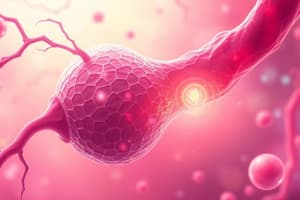Podcast
Questions and Answers
What is the role of estrogen in the female reproductive system?
What is the role of estrogen in the female reproductive system?
Estrogen is responsible for the development of secondary sexual characteristics and the growth of the uterine lining during the menstrual cycle.
Where does fertilization usually occur in humans?
Where does fertilization usually occur in humans?
Fertilization usually occurs within the fallopian tubes.
What is the function of progesterone in the female reproductive system?
What is the function of progesterone in the female reproductive system?
Progesterone is responsible for the thickening of the uterine lining and the maintenance of pregnancy.
What is spermatogenesis?
What is spermatogenesis?
Define infertility.
Define infertility.
Flashcards are hidden until you start studying
Study Notes
Human Reproductive System
The human reproductive system is a set of male and female reproductive organs that work together to produce offspring. It involves the fusion of male and haploid female gametes, resulting in the formation of a diploid zygote.
Female Reproductive System
The female reproductive system consists of:
- Ovaries: The source of the ovum, or egg, and the female hormones that cause full development of secondary sexual characteristics.
- Fallopian tubes: The site of fertilization, where the ovum is conveyed from the ovary to the uterus.
- Uterus: The site of gestation, where the fertilized ovum develops into a fetus.
- Vagina: The birth canal, where the fetus passes during childbirth.
The female reproductive system is regulated by the menstrual cycle, which is controlled by the hormones estrogen and progesterone.
Male Reproductive System
The male reproductive system consists of:
- Testes: The source of sperm and the male hormone testosterone.
- Scrotum: A sac-like organ that maintains a temperature necessary for the production of sperm.
- Vas deferens: A tube that carries the sperm from the testes to the penis.
- Penis: The organ that introduces sperm into the female reproductive tract during sexual intercourse.
The male reproductive system is regulated by the hormone testosterone.
Reproduction Process
The process of human reproduction can be divided into three stages:
- Pre-fertilization: This stage involves the maturation of the gametes and their release. In females, this occurs during ovulation. In males, this occurs during spermatogenesis.
- Fertilization: This stage involves the fusion of the gametes. In humans, this usually occurs within the fallopian tubes.
- Post-fertilization: This stage involves the development of the fertilized ovum into an embryo and, eventually, a fetus. This process takes place within the uterus and involves the formation of the placenta, which nourishes the fetus.
Role of Hormones
The reproductive system is regulated by various hormones, including:
- Estrogen: A female sex hormone that is responsible for the development of secondary sexual characteristics and the growth of the uterine lining during the menstrual cycle.
- Progesterone: A female sex hormone that is responsible for the thickening of the uterine lining and the maintenance of the pregnancy.
- Testosterone: A male sex hormone that is responsible for the development of secondary sexual characteristics and the production of sperm.
Diseases and Disorders
The human reproductive system can be affected by various diseases and disorders, including:
- Genetic or Congenital Abnormalities: These are conditions present at birth that can affect reproductive function.
- Cancers: Malignancies that can affect the reproductive organs.
- Infections: Sexually transmitted infections and other infections that can affect the reproductive system.
- Varicocele: A condition that affects the scrotum and can lead to infertility.
- Sexual Dysfunction: A broad term that refers to various forms of sexual dysfunction, including erectile dysfunction and female sexual dysfunction.
- Infertility: A condition where a couple is unable to conceive after one year of trying.
In conclusion, the human reproductive system is a complex organ system responsible for the production and transfer of gametes, fertilization, and the development of an embryo into a fetus. It is regulated by hormones and can be affected by various diseases and disorders.
Studying That Suits You
Use AI to generate personalized quizzes and flashcards to suit your learning preferences.




